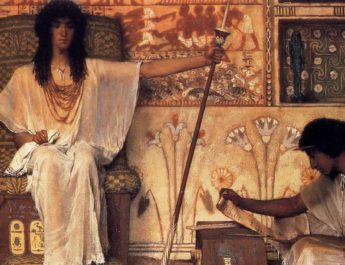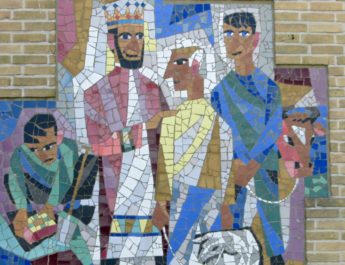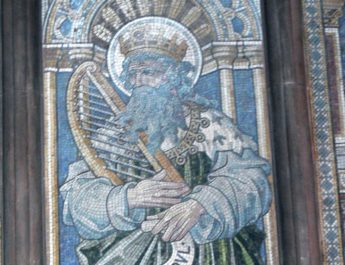Numbers 25
1 While IsraelI was stayingII at Shittim,III
I “Israel” = Yisrael. From sarah (to persist, exert oneself, contend, persevere, wrestle, prevail) + El (God or god). This is Israel, meaning God strives or one who strives with God; new name for Jacob and for his offspring. This refers to the people and to the land.
II “staying” = yashab. This is to sit and so to remain and so to dwell. It is sitting for any reason – as a judge, in order to ambush, or just sitting quietly. Causatively, this can mean settling or marrying. This can also mean continue, endure, or establish.
III “Shittim” = Shittim. 5x in OT. From the same as shittah (acacia); from the same as shotet (whip, goad); from shot (whip – literal or figurative); from shut (to push, wander around, row, travel). This is Shittim. It means “acacias” See https://www.abarim-publications.com/Meaning/Shittim.html
the peopleIV beganV to have sexual relationsVI with the womenVII of Moab.VIII
IV “people” = am. From amam (to darken, hide, associate; creating shadows by huddling together). This is people or nation. It can be used specifically for a tribe, collectively of troops or armies, or figuratively to refer to a flock of animals.
V “began” = chalal. This is to pierce, which implies to wound. It is used figuratively for making someone or something profane or breaking your word. It can also mean to begin as though one opened a wedge. Also, to eat something as a common thing.
VI “have sexual relations” = zanah. This is to fornicate, commit adultery, be a prostitute. Figuratively, it can mean committing idolatry.
VII “women” = bat. From ben (son literal or figurative; also, grandson, subject, nation); from banah (to build or obtain children). This is daughter in a literal or figurative sense.
VIII “Moab” = Moab. May be from ab (father, ancestor, grandfather; father in a literal or figurative sense). This is Moab or Moabite. Name could mean “from her father” in reference to the incestuous relationship between Lot and his daughters. The name could also mean, more pleasantly, “seed of a father” or “desirable land.” See https://en.wikipedia.org/wiki/Moab
2 These invitedIX the people to the sacrificesX of their gods,XI and the people ateXII and bowed downXIII to their gods.
IX “invited” = qara. This is to call or call out – to call someone by name. Also used more broadly for calling forth.
X “sacrifices” = zebach. From zabach (to kill, slay, offer; slaughtering an animal to offer as a sacrifice). This is a slaughter – literally of an animal. So, it implies the act or the animals used in sacrifice. Further, it can mean offering.
XI “gods” = elohim. Related to “Israel” in v1. From Eloah (God, a god); from El (see note I above). This is most commonly used as a name for God. Technically, it’s in the plural, i.e. gods. It can also mean great, mighty, judge, or ruler.
XII “ate” = akal. This is to eat, devour, burn up, or otherwise consume. It can be eating in a literal or figurative sense.
XIII “bowed down” = shachah. This is to bow down, make a humble entreaty, to do homage to royalty or to God.
3 Thus Israel yokedXIV itself to the Baal of Peor,XV and the Lord’sXVI angerXVII was kindledXVIII against Israel.
XIV “yoked” = tsamad. 5x in OT. This is to bind, attach, frame, serve, or contrive.
XV “Baal of Peor” = Baal Peor. 6x in OT. From Baal (Baal, used for several Canaanite gods; literally, “lord”); {from the same as baal (owner, master, husband); from baal (to marry, have dominion over, to master)}} + Peor (Peor – a mountain in Moab and a god of Moab; perhaps meaning gap); {from paar (to gape, yawn; open wide – especially the mouth – in a literal or figurative sense)}. This is Baal of Peor, a god of Moab.
XVI “Lord’s” = YHVH. From havah (to be, become) or hayah (to come to pass, become, be). This is the name of the God of Israel, the self-existent and eternal one, the tetragrammaton. This pronunciation has been lost to time so “Lord” is generally used in its place.
XVII “anger” = aph. From anaph (to be angry; properly, breathing hard as a signifier of being enraged). This properly refers to the nose or nostril and by extension the face. It can specifically refer to anger or wrath as one breathes hard and nostrils flare in times of great anger.
XVIII “kindled” = charah. Perhaps related to charar (to be hot, burn, glow, melt, be scorched; figuratively, to incite passion, be angry). This is to be displeased, burn with anger, glow, become warn. Figuratively it is a blaze of anger, zeal, or jealousy.
4 The Lord said to Moses,XIX “TakeXX allXXI the chiefsXXII of the people
XIX “Moses” = Mosheh. From mashah (to pull out in a literal or figurative sense, to draw out) OR from Egyptian mes or mesu (child, son i.e. child of…). This is Moses – the one drawn out from the water, which is to say, rescued. If derived from the Egyptian, his name would share a root with Rameses and Thutmose.
XX “take” = laqach. This is to take, accept, carry away, receive. It can also have the sense of take a wife or take in marriage.
XXI “all” = kol. From kalal (to complete). This is all or every.
XXII “chiefs” = rosh. This may come a word that means to shake. It is the head, captain, or chief. It can also be excellent or the forefront. It can be first in position or in statue or in time (i.e. the beginning).
and impaleXXIII them inXXIV the sunXXV before the Lord, in order that the fierceXXVI anger of the Lord may turn awayXXVII from Israel.”
XXIII “impale” = yaqa. 8x in OT. This is dislocated, severed, alienated, or figuratively abandoned. It can also mean rotting, which causes pieces to drop off bit by bit.
XXIV “in” = neged. From nagad (to declare, make conspicuous, stand in front, manifest, predict, explain). This is in front of, opposite to. It can refer to a counterpart or partner, one corresponding to or in the sight of.
XXV “sun” = shemesh. This is sun or toward the east. Its root may mean being brilliant. Figuratively, this could be a ray or an arch.
XXVI “fierce” = charon. Related to “kindled” in v3. From charah (see note XVIII above). This is burning anger, fierceness, or wrathfulness.
XXVII “turn away” = shub. To turn back, return, turn away – literally or figuratively. Doesn’t necessarily imply going back to where you started from. This is also the root verb for the Hebrew word for repentance “teshubah.”
5 And Moses said to the judgesXXVIII of Israel, “EachXXIX of you shall killXXX any of your peopleXXXI who have yoked themselves to the Baal of Peor.”
XXVIII “judges” = shaphat. This is to judge, defend, pronounce judgment, condemn, or govern. It can refer to God judging or to human judges. This is pronouncing a verdict in favor or against so it implies consequences or punishment. It can also mean to litigate or govern as one with authority.
XXIX “each” = enosh. From anash (to be weak, sick, or frail). This is human, humankind, another. It is mortal.
XXX “kill” = harag. This is to strike with deadly intent so it can be kill, destroy, murder, or put to death.
XXXI “people” = enosh. Same as “each” in v5. See note XXIX above.
6 Just thenXXXII oneXXXIII of the IsraelitesXXXIV cameXXXV and broughtXXXVI
XXXII “just then” = hinneh. From hen (lo! Behold! If, though; an expression of surprise). This is to draw attention, show suddenness or surprise, or to emphasize the importance of the coming statement. See! Lo! Behold!
XXXIII “one” = ish. Related to “each” in v5. See note XXIX above. Perhaps from enosh (see note XXIX above). This is man, husband, another, or humankind.
XXXIV “Israelites” = ben + Yisrael. Literally, “children of Israel.” Ben is related to “women” in v1. See note VII above. Yisrael is the same as “Israel” in v1. See note I above.
XXXV “came” = bo. This is to enter, come in, advance, fulfill, bring offerings, enter to worship, attack. It can also have a sexual connotation.
XXXVI “brought” = qarab. This is to come near, offer, make ready, approach, take.
a Midianite womanXXXVII into his family,XXXVIII in the sightXXXIX of Moses and in the sight of the wholeXL congregationXLI of the Israelites,
XXXVII “Midianite woman” = Midyani. 8x in OT. From midyan (Midian, Midianite, meaning “strife” or “place of judgment”); from the same as midyan (brawling, contention); from the same as madon (strife, contention, brawling); from din (to judge, defend, dispute, govern, strive). This is Midianite.
XXXVIII “family” = ach. This is brother, kindred, another, other, like. It is literally brother, but it can also be someone who is similar, resembling, or related to.
XXXIX “sight” = ayin. This is eye in a literal or figurative sense so eye, appearance, favor, or a fountain (the eye of the landscape).
XL “whole” = kol. Same as “all” in v4. See note XXI above.
XLI “congregation” = edah. From yaad (to appoint, assemble or gather selves, agree) OR from ed (witness, testimony, recorder); from ud (to admonish, repeat, duplicate, testify, restore, record, relieve). This is a congregation, assembly, or company. It could be a family, crowd, or fixture.
while they were weepingXLII at the entranceXLIII of the tentXLIV of meeting.XLV
XLII “weeping” = bakah. This is to weep, complain, or lament.
XLIII “entrance” = pethach. From pathach (to open wide in a literal or figurative sense; to open, draw out, let something go free, break forth, to plow, engrave, or carve). This is any kind of opening – a door, entrance, gate.
XLIV “tent” = ohel. Perhaps from ahal (to shine, be clear). This is a tent, covering, home, or side pillar.
XLV “meeting” = moed. Related to “congregation” in v6. From yaad (see note XLI above). This is a meeting, assembly, fixed time. It can be used for a festival or feast. It can also refer to a meeting place.
7 When PhinehasXLVI son of Eleazar,XLVII son of AaronXLVIII the priest,XLIX
XLVI “Phinehas” = Phinechas. Perhaps from peh (mouth in a literal or figurative sense; literally, beak or jaws; figuratively, speech, commands, or promises); {perhaps from pa’ah (to puff, scatter, cut in pieces)} + nachash (a serpent or snake); {from nachash (to divine, interpret omens, learn from experience, observe; to hiss)} OR from panah (to turn, face, appear) + chasah (to seek refuge). This is Phinehas, a name that may mean “mouth of a serpent,” “bronze-colored one,” “mouth of brass,” “oracle,” “trust your heart,” or “turn and hide.” See https://www.abarim-publications.com/Meaning/Phinehas.html
XLVII “Eleazar” = Elazar. Related to “Israel” in v1 & “gods” in v2. From El (see note I above) + azar (to help, protect, support, ally; properly, to surround so as to provide aid). This is Elezar or Elazar, meaning “God has helped” or “God is helper.”
XLVIII “Aaron” = Aharon. Derivation uncertain. May mean “bearer of martyrs” OR be related to Ancient Egyptian ꜥḥꜣ rw (warrior lion) OR elevated, exalted, high mountain. This is Aaron. See https://en.wiktionary.org/wiki/Aaron
XLIX “priest” = kohen. This is literally the one who officiates i.e. the priest. This is where the Jewish last name “Cohen” (and its variants) comes from.
sawL it, he got upLI and leftLII the congregation. Taking a spearLIII in his hand,LIV
L “saw” = raah. This is to see in a literal or figurative sense so stare, advise, think, view.
LI “got up” = qum. To arise, stand, accomplish, establish, abide. This is rising as in rising against, getting up after being sick or asleep, arising from one state to another, becoming powerful, or rising for action. It can also be standing in a figurative sense.
LII “left” = tavek. Literally, “from among.” This is among, middle, in the midst, the center. Perhaps, properly, to sever.
LIII “spear” = romach. 15x in OT. May come form a word that means to hurt. It could be a spear, lancet, buckler. It focuses on the iron tip.
LIV “hand” = yad. This is hand, ability, power. Hand in a literal sense, but also what one can do or the means by which one does it.
8 he wentLV afterLVI the Israelite manLVII into the tentLVIII
LV “went” = bo. Same as “came” in v6. See note XXXV above.
LVI “after” = achar. From achar (to remain behind, linger, continue, be behind, or delay; can also imply procrastination). This is after or the last part, following.
LVII “man” = ish. Same as “one” in v6. See note XXXIII above.
LVIII “tent” = qubbah. 1x in OT. From the same as qab (a hollow thing that is used to measure dry goods – a kab or cab); from qabab (to scoop out – to curse or blaspheme). This is a pavilion with a high dome, a tent.
and piercedLIX the twoLX of them, theLXI Israelite and the woman,LXII through the belly.LXIII
LIX “pierced” = daqar. 11x in OT. This is to stab, pierce, wound. It can also mean to starve or revile.
LX “two” = shenayim. From sheni (double, again, another, second); from shanah (to fold, repeat, double, alter, or disguise). This is two, both, second, couple.
LXI {untranslated} = ish. Same as “one” in v6. See note XXXIII above.
LXII “woman” = ishshah. Related to “each” in v5 & “one” in v6. From ish (see note XXXIII above). This is woman, wife, or female.
LXIII “belly” = qobah. Related to “tent” in v8. 1x in OT. From the same as qebah (stomach, body); from qabab (see note LVIII above). This is belly or abdomen.
So the plagueLXIV was stoppedLXV among the Israelites. 9 Nevertheless those who diedLXVI by the plague wereLXVII twentyLXVIII-fourLXIX thousand.LXX
LXIV “plague” = maggephah. From nagaph (to strike, beat, hurt, stumble, defeat, inflict disease). This is a blow, calamity, plague, or defeat.
LXV “stopped” = atsar. To inclose, restrain, keep, hold back, or prevail. It can also mean to maintain, rule, or gather together.
LXVI “died” = mut. This is to die in a literal or figurative sense. It can also refer to being a dead body.
LXVII “were” = hayah. Related to “Lord’s” in v3. See note XVI above.
LXVIII “twenty” = esrim. From the same as eser (ten, tenth). This is twenty or twentieth.
LXIX “four” = arba. From raba (to make square or be four-sided). This is four.
LXX “thousand” = eleph. Perhaps from the same as eleph (herd, cattle); from alaph (to learn, speak, associate with). This is thousand.
10 The Lord spokeLXXI to Moses, saying, 11 “Phinehas son of Eleazar, son of Aaron the priest, has turned backLXXII my wrathLXXIII from the Israelites by manifesting such zealLXXIV amongLXXV them on my behalf that in my jealousyLXXVI I did not consumeLXXVII the Israelites.
LXXI “spoke” = dabar. This is generally to speak, answer, declare, or command. It might mean to arrange and so to speak in a figurative sense as arranging words.
LXXII “turned back” = shub. Same as “turn away” in v4. See note XXVII above.
LXXIII “wrath” = chemah. From yacham (to be hot, mate; figuratively, to conceive). This is heat – figuratively it can be anger or fury. It can also refer to poison or venom as they can cause fever.
LXXIV “manifesting such zeal” = qinah…qinah. Perhaps from qana (to be jealous, zealous, envious). This is zeal, jealousy, envy, anger, passion rivalry.
LXXV “among” = tavek. Same as “left” in v7. See note LII above.
LXXVI “jealousy” = qinah. Same as “manifesting such zeal” in v11. See note LXXIV above.
LXXVII “consume” = kalah. This is to end, be finished, complete, prepare, consume, spent, or completely destroyed.
12 ThereforeLXXVIII say, ‘LXXIXI hereby grantLXXX him my covenantLXXXI of peace.LXXXII
LXXVIII “therefore” = ken. Perhaps from kun (properly, in a perpendicular position; literally, to establish, fix, fasten, prepare; figuratively, it is certainty, to be firm, faithfulness, render sure or prosperous). This is to set upright. Generally used figuratively to mean thus, so, afterwards, rightly so.
LXXIX {untranslated} = hen. Related to “just then” in v6. See note XXXII above.
LXXX “grant” = natan. This is to give, put, set, offer. It is to give literally or figuratively.
LXXXI “covenant” = berit. Perhaps from barah (to eat, choose, make clear); perhaps from bar (grain, wheat); from bara (to select, purify, cleanse, test, brighten, polish). This is a compact, covenant, alliance, treaty, or league.
LXXXII “peace” = shalom. From shalam (to be complete or sound; to have safety mentally, physically, or extending to one’s estate; so, if these things are safe and complete, the implication is that one would be friendly; and, if being friendly, one would make amends and that friendship would be reciprocated). This is completeness, soundness, welfare, favor, friend, good health. It is to be safe and figuratively well, happy, at peace, friendly. Abstractly, it includes the ideas of welfare and prosperity (not in excessive wealth, but in having enough).
13 It shall be for him and for his descendantsLXXXIII after him a covenant of perpetualLXXXIV priesthood,LXXXV becauseLXXXVI he was zealousLXXXVII for his GodLXXXVIII and made atonementLXXXIX for the Israelites.’”
LXXXIII “descendants” = zera. From zara (to sow or scatter seed; conceive or yield). This is seed or sowing. It can, thus, mean a fruit, plant, sowing time, child, offspring, or posterity.
LXXXIV “perpetual” = olam. This is a long scope of time whether in the past (antiquity, ancient time) or in the future (eternal, everlasting).
LXXXV “priesthood” = kehunnah. Related to “priest” in v7. 14x in OT. From the same as kohen (see note XLIX above). This is priesthood or priestly duties.
LXXXVI “because” = tachat. This is underneath, below, the bottom, instead of.
LXXXVII “was zealous” = qanah. Related to “manifesting such zeal” in v11. From qinah (see note LXXIV above). This is to be zealous or to provoke to jealousy.
LXXXVIII “God” = Elohim. Same as “gods” in v2. See note XI above.
LXXXIX “made atonement” = kaphar. This is to appease, cover, pacify, cancel, make atonement, placate. Specifically, it can mean to cover with bitumen.
14 The nameXC of the slainXCI Israelite man who was killedXCII with the Midianite woman
XC “name” = shem. May be from sum (to put, place, set). This is name, fame, renown. A name was thought to indicate something essential about a person – something about their individuality. So, this word can also mean honor, authority, or character.
XCI “slain” = nakah. This is to hit whether lightly or severely. It can be used in a literal or figurative sense. So, this could be beat, punish, give wounds, kill, or slaughter.
XCII “killed” = nakah. Same as “slain” in v14. See note XCI above.
was ZimriXCIII son of Salu,XCIV headXCV
XCIII “Zimri” = Zimri. Related to “Lord’s” in v3 & “were” in v9. 15x in OT. From zamar (making music; used specially of music to worship God; music with singing, singing praise, singing psalms); {may be from zamar (to trim or prune); perhaps related to zemer (a sheep or antelope)} OR from zamar (see above) + Yah (the shortened form of the name of the God of Israel; God, Lord); {from YHVH (see note XVI above)}. This is Zimri, meaning, “musical” or “my musician” or “my gardener” or “song of the Lord” or “my mountain sheep” or “pertaining to an antelope.” See https://www.abarim-publications.com/Meaning/Zimri.html
XCIV “Salu” = Salu. 6x in OT. From salah (make light of, reject) OR from salal (to lift up, build, pile, extol, exalt; can also be used for opposing as a dam holds back water). This is Salu or Sallai, meaning “weighed” or “heaping up” or “highway making” or “restored” or “contempt” or “rejecter” or “lifted up of the Lord.” See https://www.abarim-publications.com/Meaning/Salu.html
XCV “head” = nasi. From nasa (to lift in a broad sense, literally and figuratively; to carry, take, or arise; to bring forth, advance, accept). This is one lifted up or exalter. So, it could be prince, chief, ruler, captain, king, or vapor.
of an ancestralXCVI houseXCVII belonging to the Simeonites.XCVIII
XCVI “ancestral” = ab. Related to “Moab” in v1. See note VIII above.
XCVII “house” = bayit. Related to “women” in v1 & “Israelites” in v6. Probably from banah (see note VII above). This is house, court, family, palace, temple.
XCVIII “Simeonites” = Shimoni. 4x in OT. From Shimon (Simon – Jacob’s son and his tribe); from shama (to hear, often implying attention and obedience). This is Simeonite, offspring of Simeon.
15 The name of the Midianite woman who was killedXCIX was CozbiC daughterCI of Zur,CII
XCIX “killed” = nakah. Same as “slain” in v14. See note XCI above.
C “Cozbi” = Kozbi. 2x in OT – both in this passage. From kazab (to lie, be false or in vain, to fail; to deceive in a literal or figurative sense). This is Cozbi or Kozbi, meaning “false” or “lying.” See https://www.abarim-publications.com/Meaning/Cozbi.html
CI “daughter” = bat. Same as “women” in v1. See note VII above.
CII “Zur” = Tsur. 5x in OT. From tsur (rock, stone, cliff, boulder, rocky; a refuge, God); from tsur (to confine, cramp, or bind in a literal or figurative sense; to besiege, assault, or distress). This is Zur or Tsur, meaning “rock.”
who was the headCIII of a clan,CIV an ancestral house in Midian.CV
16 The Lord spoke to Moses, saying, 17 “HarassCVI the Midianites, and defeatCVII them,
CIII “head” = rosh. Same as “chiefs” in v4. See note XXII above.
CIV “clan” = ummah. 3x in OT. From the same as em (mother as binding a family together or a breeding female animal; mother in a literal or figurative sense). This is tribe or other community.
CV “Midian” = Midyan. Related to “Midianite woman” in v6. See note XXXVII above.
CVI “harass” = tsarar. This is to bind, restrict, narrow, be cramped, an adversary.
CVII “defeat” = nakah. Same as “slain” in v14. See note XCI above.
18 for they have harassed you by the trickeryCVIII with which they deceivedCIX you in the affairCX of Peor,CXI
CVIII “trickery” = nekel. 1x in OT. From nakal (to deceive, be treacherous, conspire). This is trickery deceit, or wiliness.
CIX “deceived” = nakal. Related to “trickery” in v18. 4x in OT. See note CVIII above.
CX “affair” = dabar. Related to “spoke” in v10. From dabar (see note LXXI above). This is speech, a word, a matter, an affair, charge, command, message, promise, purpose, report, request. It is a word, which implies things that are spoken of in a wide sense.
CXI “Peor” = Peor. Related to “Baal of Peor” in v3. 5x in OT. See note XV above.
and in the affair of Cozbi, the daughter of a leaderCXII of Midian, their sister;CXIII she was killedCXIV on the dayCXV of the plague that resultedCXVI fromCXVII, CXVIII Peor.”
CXII “leader” = nasi. Same as “head” in v14. See note XCV above.
CXIII “sister” = achot. Related to “family” in v6. From the same as ach (see note XXXVIII above). This is sister in a literal or figurative sense. It can also mean another or together.
CXIV “killed” = nakah. Same as “slain” in v14. See note XCI above.
CXV “day” = yom. Root may mean being hot. This is the day in a literal or figurative sense. It can also mean birth, age, daylight, continually or other references to time.
CXVI “resulted” = hayah. Same as “were” in v9. See note LXVII above.
CXVII “from” = achar. Same as “after” in v8. See note LVI above.
CXVIII {untranslated} = dabar. Same as “affair” in v18. See note CX above.
Image credit: AI generated image from picsart.com




